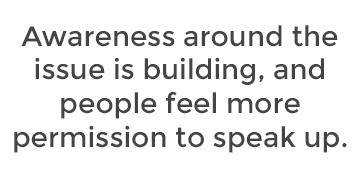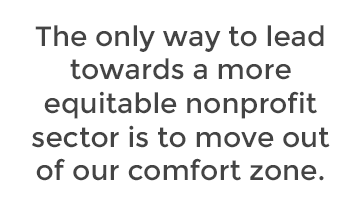

In late 2017, the #MeToo movement entered the mainstream consciousness, spreading rapidly across social media and major news outlets, moving from industry to industry. Survivors shared their stories, allies stood in solidarity, and an onslaught of sexual harassment and assault allegations came to light.
To gauge the prevalence of sexual harassment in the fundraising profession, The Chronicle of Philanthropy and the Association of Fundraising Professionals (AFP) surveyed practitioners and PUBLISH the research in April 2018. Their findings revealed a significant problem.
One in four female fundraisers has experienced sexual harassment in the workplace. Two-thirds of fundraisers who reported harassment said that donors were responsible. The other third said colleagues (generally in senior roles) were responsible.
The fundraising profession is far from immune to sexual harassment—but we see progress to break the silence. To show our support for the movement and be a voice for equity and inclusion, we asked the Campbell & Company executive team to discuss the importance of ensuring all professionals are treated with respect and feel safe in the fundraising world.
The Chronicle of Philanthropy and AFP released their sexual harassment study nearly three months ago. What have you been hearing about this topic?
Kate Roosevelt: More and more, I’m hearing clients and colleagues discussing the work that is happening around diversity, equity, inclusion, and access. These conversations are closely tied to the issue of sexual harassment in the workplace and the #MeToo movement.
Julia McGuire: I agree. I’ve noticed that our sector is recognizing more and more that internal concerns and relationships matter just as much as their donor relationships.
Peter Fissinger: I’ve observed that the nonprofit world is reaching a new level of understanding
about equity—what it means and how important it is. There’s been a deeper examination of how we treat people and a recognition that our workplaces need to be safe and equitable for all.
Given the broader #MeToo movement, do you feel that this is the beginning of real change within our industry?
Peter: I do think we’ve started to see change, but it’s going to take vigilance to ensure it continues. In
I do see a real shift in peoples’ attitudes and their willingness to hold others accountable.
Kate: Building on that, I think we’re in the awareness phase of change. Awareness around the issue is building, and people feel more permission to speak up.
At the same time, we still have a great deal to tackle. The power dynamics that exist in some donor-fundraiser relationships make this especially challenging, but the increasing sense of safety and openness is an important first step.
Julia: The willingness of leaders to enforce organizational policies and the ability of employees to feel more comfortable coming forward are such important outgrowths of this.
I also think men are becoming more aware of sexual harassment in the workplace. Men really have to lean in and be willing to hear it and accept it in order to cultivate that sense of safety that Kate mentioned.
What are Campbell & Company’s plans to address the issue of sexual harassment in the fundraising profession?
Julia: We can model transparency, openness, and creating an environment where our staff feel comfortable. Our team members can also direct clients to the right resources when they come to us with an issue.
Kate: We’re advocates for developing best practices to guide the work of our clients, our profession, and the sector as a whole. I think we have a role to play in helping organizations develop and adopt best practices in this area, as well.
We also stand ready to help facilitate and convene conversations around this topic in the communities where we work and live. By flagging issues and shining a spotlight on them, we can create a higher level of awareness and hopefully inspire people to be more proactive in addressing sexual harassment.
Peter: And it starts at home. Strengthening the investment in our commitment to diversity, equity,
Kate: Our diversity, equity, and inclusion task force has engaged an outside partner to create a change management strategy and help us work toward a number of goals. These include fostering an inclusive workplace, increasing the diversity of our firm, and ultimately working to build equity in our profession and the world.
What role does each of us play in working to create a more just and equitable nonprofit sector?
Kate: At the most basic level, each of us has to do the personal work, examining the views and practices that we all have been taught and have developed over time. To some degree, we need to unlearn and relearn where needed, and we need to commit to a similar process at an organizational level.
Julia: I think it’s our job to constantly assess our leadership in this area. At times, we will be uncomfortable, and that can be a positive outcome. The only way to lead towards a more equitable nonprofit sector is to move out of our comfort zone.
Peter: It’s going to take work, but we need to remember that our policies matter, our words matter, and our actions matter.